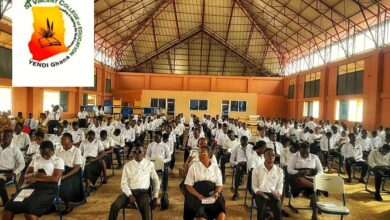
The recent changes in the format of schooling in colleges of education have been driven by the unprecedented challenges posed by the Covid-19 pandemic. The track system, which was initially implemented, required certain batches or levels of students to stay home while others attended classes on campus. However, as the situation evolved and new information emerged, colleges recognized the need for a more efficient and effective system.
The IN-IN-IN-OUT system was introduced as a response to these evolving circumstances. Under this new format, levels 100 to 300 are allowed to attend classes on campus, while level 400 student teachers are required to remain off-campus. This system aims to strike a balance between ensuring the continuity of education and prioritizing the safety and well-being of students and staff.
However, the implementation of the IN-IN-IN-OUT system has not been without its challenges. One of the most pressing issues faced by colleges of education is the accommodation problem. Principals and administrators are grappling with the question of where student teachers will sleep during the semester. The shortage of suitable housing options has become a significant concern, impacting the overall effectiveness of the new system.
To address this challenge, colleges are exploring various solutions. Some institutions are considering the construction of additional dormitories or temporary housing facilities to accommodate the student teachers. Others are partnering with local communities to provide alternative housing options. These collaborative efforts aim to ensure that student teachers have a safe and comfortable place to stay during their off-campus semester.
For example, St. Vincent College of Education has taken a proactive approach to tackle the accommodation issue. Under the leadership of Dr. Norviewu-Mortty, the college has initiated discussions with local authorities and community leaders to explore potential solutions. This collaborative approach not only helps alleviate the accommodation problem but also fosters a sense of community engagement and support.

Located in the Northern Region of Yendi, St. Vincent College of Education stands as a prominent institution in the field of education. Led by the esteemed Dr. Erasmus Norviewu-Mortty, the college is dedicated to providing quality education to its students.
However, one pressing issue that the college faces is the need for additional buildings. The demand for more infrastructure has become increasingly evident, particularly in light of the challenges faced by student teachers in finding suitable accommodation.
To address this issue, Dr. Norviewu-Mortty has proposed a unique solution – the construction of round-shaped dormitories. This innovative approach not only offers a practical solution to the immediate housing problem but also provides an opportunity for student teachers to experience the lifestyle of the Northern Region.
The round round houses, as depicted in the picture below, will not only serve as a place for student teachers to sleep but also as a means to immerse them in the local culture and environment. As the college primarily trains student teachers for rural areas, this immersive experience can help them better understand and connect with the communities they will eventually serve.





Despite the pressing need for additional buildings, the college has faced challenges in securing government assistance to complete the unfinished structures. While the college eagerly awaits support from the relevant authorities, Dr. Norviewu-Mortty remains committed to improving the college’s infrastructure and ensuring the well-being of its students.





St. Vincent College of Education, under the leadership of Dr. Norviewu-Mortty, exemplifies a commitment to providing quality education despite resource constraints. By addressing the accommodation issue and offering a unique learning experience, the college strives to prepare student teachers for their future roles in rural communities. The proposed round round houses not only offer a practical solution to the housing problem but also provide an opportunity for student teachers to embrace the lifestyle and culture of the Northern Region.







